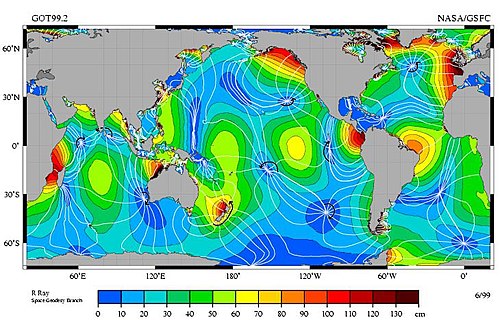Tidenoun
The periodic change of the sea level, particularly when caused by the gravitational influence of the sun and the moon.
Tidenoun
A stream, current or flood.
Tidenoun
Time, notably anniversary, period or season linked to an ecclesiastical feast.
Tidenoun
A time.
Tidenoun
A point or period of time identified or described by a qualifier (found in compounds).
Tidenoun
(mining) The period of twelve hours.
Tidenoun
Something which changes like the tides of the sea.
Tidenoun
Tendency or direction of causes, influences, or events; course; current.
Tidenoun
(obsolete) Violent confluence
Tideverb
(transitive) To cause to float with the tide; to drive or carry with the tide or stream.
Tideverb
(intransitive) To pour a tide or flood.
Tideverb
To work into or out of a river or harbor by drifting with the tide and anchoring when it becomes adverse.
Tideverb
To happen, occur.
Tidenoun
Time; period; season.
Tidenoun
The alternate rising and falling of the waters of the ocean, and of bays, rivers, etc., connected therewith. The tide ebbs and flows twice in each lunar day, or the space of a little more than twenty-four hours. It is occasioned by the attraction of the sun and moon (the influence of the latter being three times that of the former), acting unequally on the waters in different parts of the earth, thus disturbing their equilibrium. A high tide upon one side of the earth is accompanied by a high tide upon the opposite side. Hence, when the sun and moon are in conjunction or opposition, as at new moon and full moon, their action is such as to produce a greater than the usual tide, called the spring tide, as represented in the cut. When the moon is in the first or third quarter, the sun's attraction in part counteracts the effect of the moon's attraction, thus producing under the moon a smaller tide than usual, called the neap tide.
Tidenoun
A stream; current; flood; as, a tide of blood.
Tidenoun
Tendency or direction of causes, influences, or events; course; current.
Tidenoun
Violent confluence.
Tidenoun
The period of twelve hours.
Tideverb
To cause to float with the tide; to drive or carry with the tide or stream.
Tideverb
To betide; to happen.
Tideverb
To pour a tide or flood.
Tideverb
To work into or out of a river or harbor by drifting with the tide and anchoring when it becomes adverse.
Tidenoun
the periodic rise and fall of the sea level under the gravitational pull of the moon
Tidenoun
something that may increase or decrease (like the tides of the sea);
Tidenoun
there are usually two high and two low tides each day
Tideverb
rise or move foward;
Tideverb
cause to float with the tide
Tideverb
be carried with the tide
Tide
Tides are the rise and fall of sea levels caused by the combined effects of the gravitational forces exerted by the Moon and the Sun, and the rotation of the Earth. Tide tables can be used for any given locale to find the predicted times and amplitude (or ).
Currentnoun
The part of a fluid that moves continuously in a certain direction.
Currentnoun
(electricity) The time rate of flow of electric charge.
Currentnoun
A tendency or a course of events.
Currentadjective
Existing or occurring at the moment.
Currentadjective
Generally accepted, used, practiced, or prevalent at the moment.
Currentadjective
(obsolete) Running or moving rapidly.
Currentadjective
Running or moving rapidly.
Currentadjective
Now passing, as time; as, the current month.
Currentadjective
Passing from person to person, or from hand to hand; circulating through the community; generally received; common; as, a current coin; a current report; current history.
Currentadjective
Commonly estimated or acknowledged.
Currentadjective
Fitted for general acceptance or circulation; authentic; passable.
Currentnoun
A flowing or passing; onward motion. Hence: A body of fluid moving continuously in a certain direction; a stream; esp., the swiftest part of it; as, a current of water or of air; that which resembles a stream in motion; as, a current of electricity.
Currentnoun
General course; ordinary procedure; progressive and connected movement; as, the current of time, of events, of opinion, etc.
Currentnoun
a flow of electricity through a conductor;
Currentnoun
a steady flow (usually from natural causes);
Currentnoun
dominant course (suggestive of running water) of successive events or ideas;
Currentadjective
occurring in or belonging to the present time;
Currentadjective
belonging to the present time; happening or being used or done now
Currentadjective
in common or general use
Currentnoun
a body of water or air moving in a definite direction, especially through a surrounding body of water or air in which there is less movement
Currentnoun
a flow of electricity which results from the ordered directional movement of electrically charged particles
Currentnoun
a quantity representing the rate of flow of electric charge, usually measured in amperes
Currentnoun
the general tendency or course of events or opinion

















